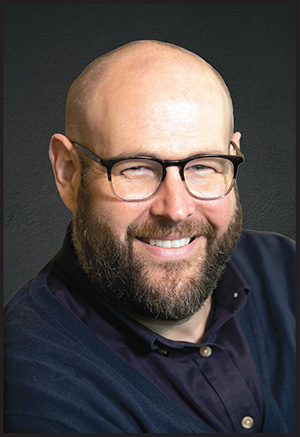Matt Huculak | Movers & Shakers 2024—Educators
As Head, Advanced Research Services and Digital Scholarship Librarian with the University of Victoria Libraries, Matt Huculak examines librarians’ role in scholarly communication, archiving, and collecting, while collaborating with other disciplines to bring that documentation to life.
 |
CURRENT POSITIONHead, Advanced Research Services & Digital Scholarship Librarian, University of Victoria Libraries, BC DEGREEMLIS, San José State University, 2017; PhD, English Language and Literature/Letters, University of Tulsa, 2009 FOLLOWvisualnarratives.org; holocaustgraphicnovels.org; bit.ly/HuculakORCID Photo by UVIC Photo Services |
The Memory Business
“We are in the documentation business, the memory business, and that’s a heavy responsibility,” says Matt Huculak. As Head, Advanced Research Services and Digital Scholarship Librarian with the University of Victoria Libraries, Huculak examines librarians’ role in scholarly communication, archiving, and collecting, while collaborating with other disciplines to bring that documentation to life.
This commitment to storytelling was evident when Huculak was invited to stay at the Ravensbrück Nazi Concentration Camp Memorial and Interpretation site in north Germany and work with researchers, artists, Holocaust survivors, and educators to develop new ideas for teaching the Holocaust through graphic novels. Huculak describes the Narrative Art and Visual Storytelling in Human Rights and Holocaust Education project as “all about memory, and who gets to tell stories.” Survivors collaborate with artists to tell those stories—including in the graphic novel But I Live: Three Stories of Child Survivors of the Holocaust.
Huculak’s other projects include the Spotlight digital exhibition platform, which, he says, impacts “how university collections and archives can be used in the teaching and research process.” Exhibits on the platform, created by librarians, scholars, and community members, highlight and interpret special collections and archives. Spotlight relies on work across university libraries, from metadata librarians to liaison librarians to archivists, as well as thoughtful consultation with faculty. It “has really shown the importance of the connector role librarians have to play in modern scholarship,” Huculak says.
Huculak’s work considers the relationship between human rights testimony and libraries, and how libraries can develop protocols for consent-based archiving and collecting. It demonstrates, he says, “what can happen when people come together consensually and creatively to tell the story that wants to be told.”
RELATED
ALREADY A SUBSCRIBER? LOG IN
We are currently offering this content for free. Sign up now to activate your personal profile, where you can save articles for future viewing










Add Comment :-
Comment Policy:
Comment should not be empty !!!